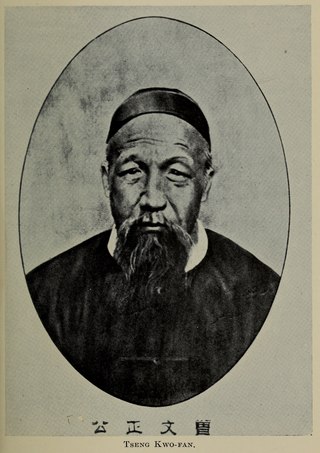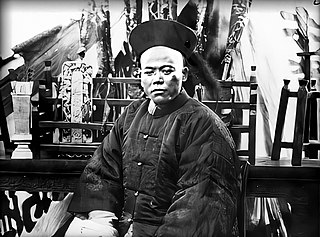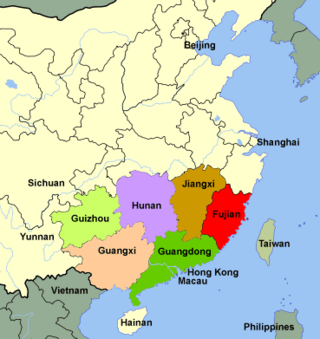This article needs additional citations for verification .(February 2024) |
| |||||
| Decades: | |||||
|---|---|---|---|---|---|
| See also: | Other events of 1864 History of China • Timeline • Years | ||||
Events from the year 1864 in China .
This article needs additional citations for verification .(February 2024) |
| |||||
| Decades: | |||||
|---|---|---|---|---|---|
| See also: | Other events of 1864 History of China • Timeline • Years | ||||
Events from the year 1864 in China .

The Xianfeng Emperor, also known by his temple name Emperor Wenzong of Qing, personal name Yizhu, was the eighth emperor of the Qing dynasty, and the seventh Qing emperor to rule over China proper, reigned from 1850 to 1861. During his reign, the Qing dynasty experienced several wars and rebellions including the Taiping Rebellion, Nian Rebellion, and Second Opium War. He was the last Chinese emperor to exercise sole power.

Zeng Guofan, Marquis Yiyong, birth name Zeng Zicheng, courtesy name Bohan (伯涵), was a Chinese statesman and military general of the late Qing dynasty. He is best known for raising and organizing the Xiang Army to aid the Qing military in suppressing the Taiping Rebellion and restoring the stability of the Qing Empire. Along with other prominent figures such as Zuo Zongtang and Li Hongzhang of his time, Zeng set the scene for the Tongzhi Restoration, an attempt to arrest the decline of the Qing dynasty. Zeng was known for his strategic perception, administrative skill and noble personality on Confucian practice, but also for his ruthlessness in repressing rebellions.

The Tongzhi Restoration was an attempt to arrest the dynastic decline of the Qing dynasty by restoring the traditional order. The harsh realities of the Opium War, the unequal treaties, and the mid-century mass uprisings of the Taiping Rebellion caused Qing officials to recognize the need to strengthen China. The Tongzhi Restoration was named for the Tongzhi Emperor, and was engineered by the young emperor's mother, the Empress Dowager Cixi (1835–1908). The restoration, however, which applied "practical knowledge" while reaffirming the old mentality, was not a genuine program of modernization. Academics are divided as to whether the Tongzhi Restoration arrested the dynastic decline or merely delayed its inevitable occurrence.

Guanwen, courtesy name Xiufeng, was a Manchu official, Grand Secretariat, military general, Viceroy of Zhili, Huguan and commander of the Army Group Central Plain during the late Qing dynasty in China.

Zeng Guoquan, courtesy name Yuanfu, art name Shuchun, was a Chinese official and military leader of the late Qing dynasty. He was the ninth brother of Zeng Guofan, a prominent statesman and general, and a descendant of the philosopher Zengzi. He served in the Xiang Army, a standing military force organised by his brother to counter the Taiping rebels, and was nicknamed "Ninth Marshal" (九帥). He was known for his expertise in siege warfare, particularly the use of trenches, hence he was also nicknamed "Zeng the Iron Container" (曾鐵桶). During the conquest of Tianjing (Nanjing), the capital of the Taiping Heavenly Kingdom, Zeng was notorious for condoning massacres of the city populace, which resulted in him being called "Zeng the Butcher" (曾屠戶).

Cheng Xueqi (Chinese: 程學啟; courtesy name Fangzhong 方忠; born in Tongcheng, Anhui, was a general of the Taiping Rebellion who surrendered to the Qing dynasty in 1861 with Ding Ruchang. He was an eminent Han Chinese official and a Captain General in the army of the late Qing dynasty. He led the Huai Army to fight effectively against the Taiping rebels and helped to restore the stability of Qing, along with other prominent figures, including Li Hongzhang and Zeng Guofan, setting the scene for the successful defense of Shanghai and the Suzhou Massacre POW Incident. The Tongzhi Emperor praised Cheng as "intelligent and brave".
Liang Chengfu was an eminent military leader of the Taiping Rebellion, and known during his military tenure as the King of Qi (啟王). He led Taiping forces to many military victories especially at Hubei and Shaanxi in central and northwest China. He was awarded the E An in 1860. Liang was an important general for late-Taiping and broke out the Hubei Pocket in August 1864 till 1865. He later joined in the Nien Rebellion and was executed by Viceroy of Sichuan Luo Bingzhang after interrogation in 1865.

The Red Turban Rebellion of 1854–1856 was a rebellion by members of the Tiandihui in the Guangdong province of South China.
Events from the year 1875 in China.
Events from the year 1872 in China.
Events from the year 1860 in China.
Events from the year 1861 in China.
Events from the year 1857 in China.
Events from the year 1856 in China.
Events from the year 1855 in China.
Events from the year 1862 in China.
Events from the year 1863 in China.
Events from the year 1865 in China.
Events from the year 1867 in China.

Vault Protector coins were a type of Chinese numismatic charm coins created by Chinese mints. These coins were significantly larger, heavier and thicker than regular cash coins and were well-made as they were designed to occupy a special place within the treasury of the mint. The treasury had a spirit hall for offerings to the gods of the Chinese pantheon, and Vault Protector coins would be hung with red silk and tassels for the Chinese God of Wealth. These coins were believed to have charm-like magical powers that would protect the vault while bringing wealth and fortune to the treasury.